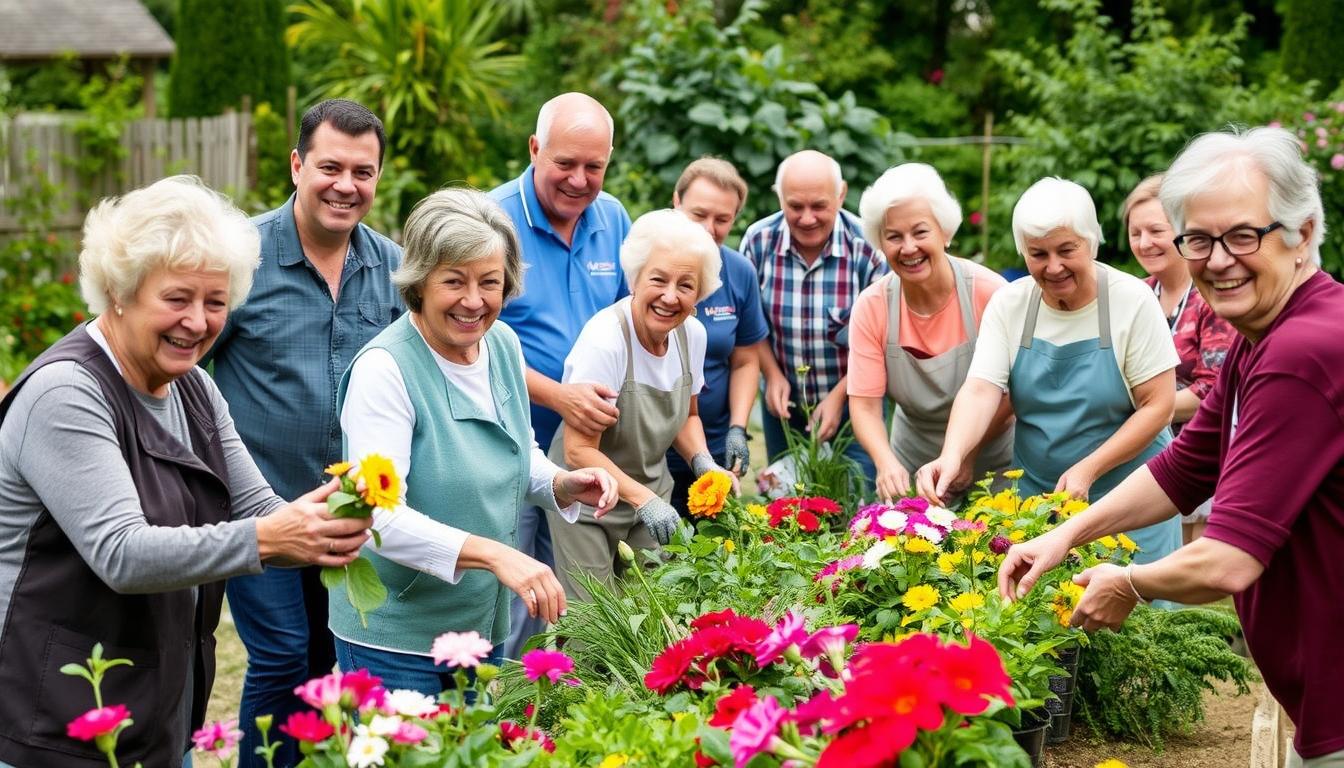Retirement is a new chapter in life, full of fresh opportunities. Many retirees enjoy volunteering, using their freedom to help others. This way, they can share their experience and stay active.
Studies show volunteering boosts retirees’ well-being. The Royal Voluntary Service found over 80% of volunteers feel better mentally. Almost half also see physical health improvements. This shows volunteering is good for both the giver and receiver.
In the UK, there are many ways for senior volunteers to help. You can work in charity shops or support patients in the NHS. Events like Volunteers’ Week and The Big Help Out are great for finding the right role.
Key Takeaways
- Retirement volunteering offers a sense of purpose and fulfilment
- Over 80% of volunteers report improved mental health
- Various volunteering options cater to different interests and skills
- Volunteering contributes £48 billion to the UK economy
- Events like Volunteers’ Week provide opportunities to explore volunteering
- Volunteering can lead to new social connections and reduced isolation
Understanding the Impact of Volunteering in Later Life
Volunteering in retirement can greatly improve one’s well-being. A study of 3,740 people over State Pension Age found volunteering’s benefits. It shows how volunteering can boost health in retirement.
Physical and Mental Health Benefits
The study showed volunteers felt better than those who didn’t help out. They had less depression, felt more satisfied with life, and scored higher on CASP-19. Those who volunteered more often saw the biggest improvements.
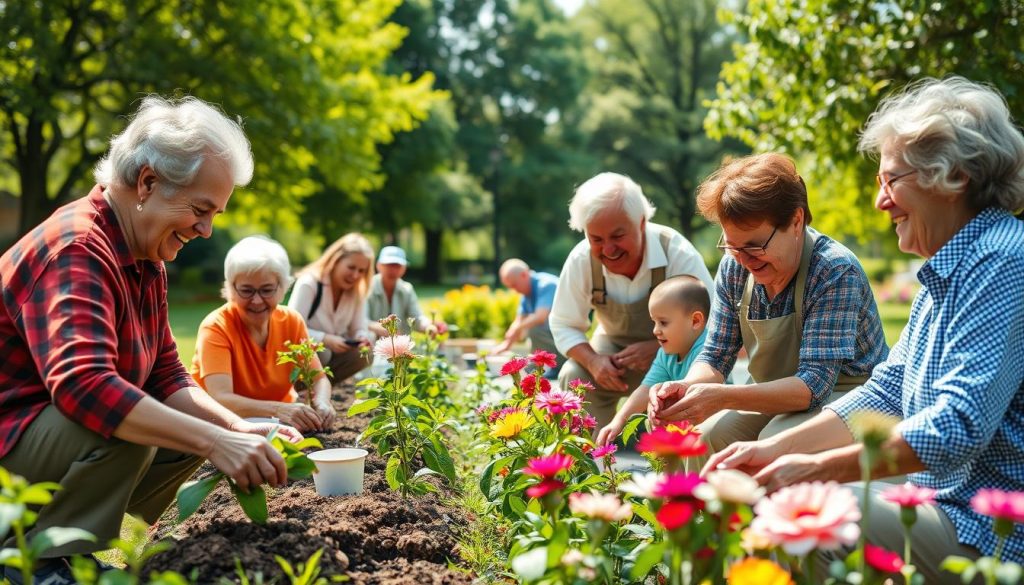
Social Connection and Community Integration
Volunteering helps fight loneliness in retirees. It makes them more social and connected to their community. This connection is key for a happy retirement.
Personal Growth and Development
Volunteering boosts self-esteem and confidence. The study found formal volunteering, like fundraising, leads to better well-being. This shows the value of planned volunteer work for personal growth.
| Aspect | Impact of Volunteering |
|---|---|
| Mental Health | Reduced depression, increased life satisfaction |
| Physical Health | Improved perceived health |
| Social Engagement | Decreased social isolation |
| Personal Development | Higher self-esteem, better self-efficacy |
The study found volunteering benefits older adults the most. Those 60 and above saw bigger gains in life satisfaction and mental health. This shows volunteering’s unique role in improving retirement health and life quality.
Why Volunteer During Retirement
Retirement brings a new chapter in life, and many find purpose in volunteering. Studies show volunteering in retirement has big benefits. A report in the Journal of Occupational and Organizational Psychology found that retirees who volunteer feel more connected to their community.
Dr. Shona G. Smith’s research shows that older adults seek meaning in their lives. Volunteering helps them find purpose after work. It lets them use their skills, meet new people, and learn new things.
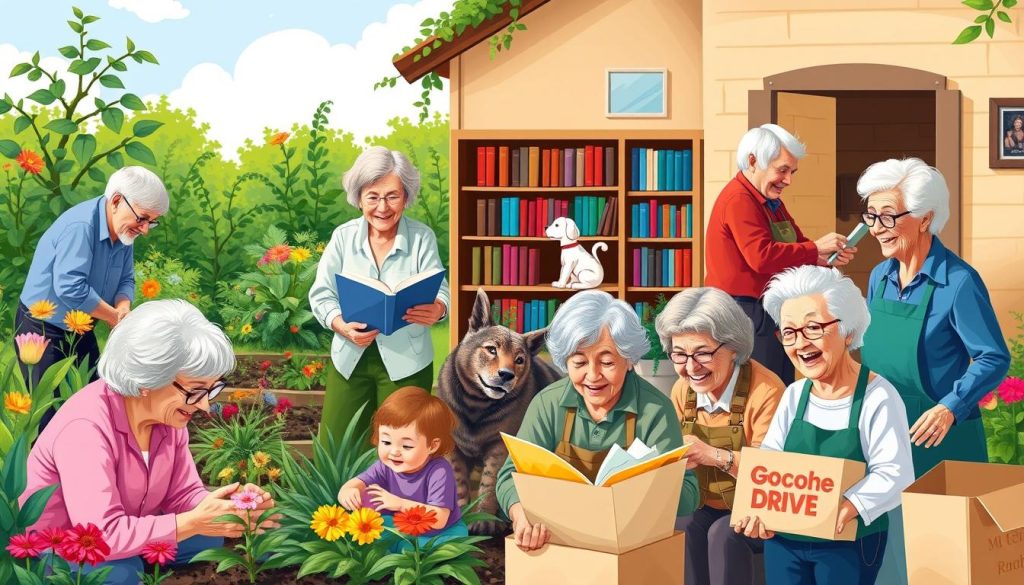
- Enhanced life satisfaction
- Improved self-esteem and confidence
- Reduced risk of health issues, including dementia
- Decreased stress, anger, and anxiety
- Opportunities for social connections
Organisations like Volunteering Matters engage over 10,000 volunteers aged 50 and above across the UK. This shows more retirees are finding joy in community service.
| Benefit | Percentage |
|---|---|
| Volunteers reporting higher life satisfaction | 100% |
| People who start volunteering to meet new friends | 21% |
| Monthly volunteers who make a new friend | 20% |
Finding the right volunteer opportunity can give a new purpose to retirement. Whether it’s helping local charities, teaching skills, or caring for animals, there’s a role for everyone. By giving their time and skills, retirees can make a real difference and enrich their own lives.
The Transition from Career to Volunteering
Starting a new journey in retirement volunteer work can be thrilling. Many retirees find joy in using their skills for good causes. This change helps communities and gives retirees a new sense of purpose.
Utilising Professional Skills
Your skills are valuable even after retirement. Teachers, accountants, and engineers are in demand. For example, retired teachers love helping disadvantaged youth. Ex-accountants help charities with their finances.
Finding New Passions
Retirement is a great time to try new things. Many find new passions through volunteering. You might enjoy helping the environment, animals, or gardening. The important thing is to be open to new experiences.
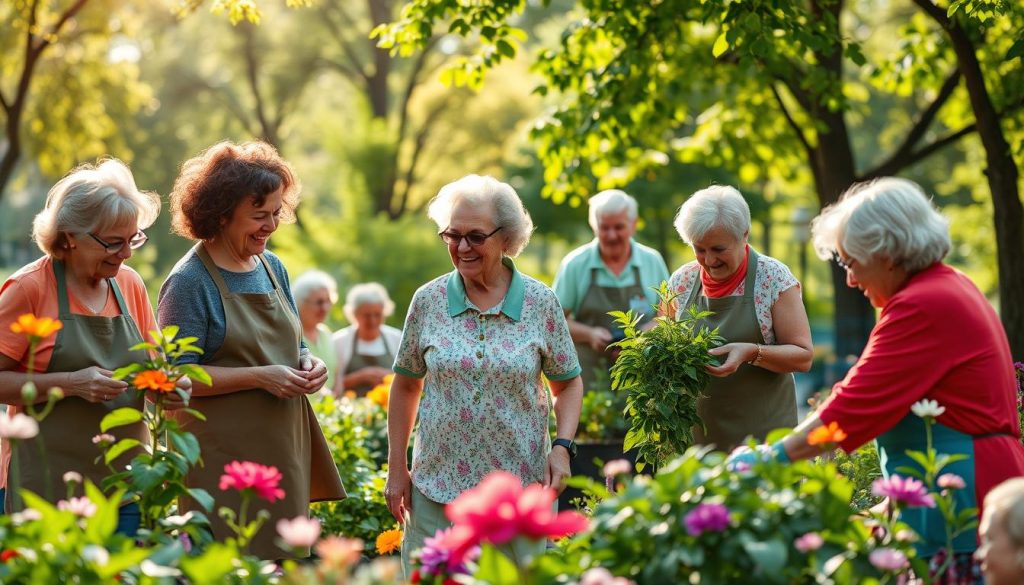
Creating a Balanced Schedule
Finding the right balance is key in volunteer work. Think about:
- Time commitment
- Physical demands
- Travel requirements
- Personal interests
Begin with a few hours a week. Then, you can increase your time as you get used to it.
| Volunteer Area | Skills Utilised | Time Commitment |
|---|---|---|
| Tutoring | Teaching, Patience | 2-4 hours/week |
| Charity Finance | Accounting, Management | 5-10 hours/week |
| Wildlife Conservation | Physical Labour, Research | Variable (Seasonal) |
Volunteering in retirement is a chance to keep learning and growing. It’s a way to give back and make your life richer.
Popular Volunteering Opportunities for Retirees
Retirees have many volunteering options to choose from. The UK’s over-50 population has grown by 47% in 40 years. This means more senior roles are needed.
Charity shops rely on volunteers because they can’t afford paid staff for many jobs. These roles are great for retirees who want to help out but don’t want to work full-time.

Volunteer driving is a rewarding choice for those who love community support. It helps elderly or disabled people move around again. This tackles big issues like feeling left out.
Cultural spots like libraries and museums are also good for retirees. They offer retirement volunteer opportunities. Here, retirees can share their special interests and help out.
For those who love adventure, volunteering abroad is a great choice. You can coach sports or work on conservation projects. It’s a chance to travel and do something meaningful at the same time.
| Volunteer Opportunity | Time Commitment | Benefits |
|---|---|---|
| Charity Shop | Flexible hours | Social interaction, retail experience |
| Volunteer Driving | As needed | Community impact, flexible schedule |
| Cultural Institutions | Regular shifts | Intellectual stimulation, sharing knowledge |
| International Volunteering | Short-term to long-term | Travel, cultural immersion, skill-sharing |
There are many volunteering options for retirees, no matter what they’re interested in or how much time they have. Everyone can find a role that suits them.
Animal Welfare and Pet-Related Volunteering
Retirement is a great time to help animals and enjoy pet-related volunteer work. These activities help our furry friends and give retirees a sense of purpose.
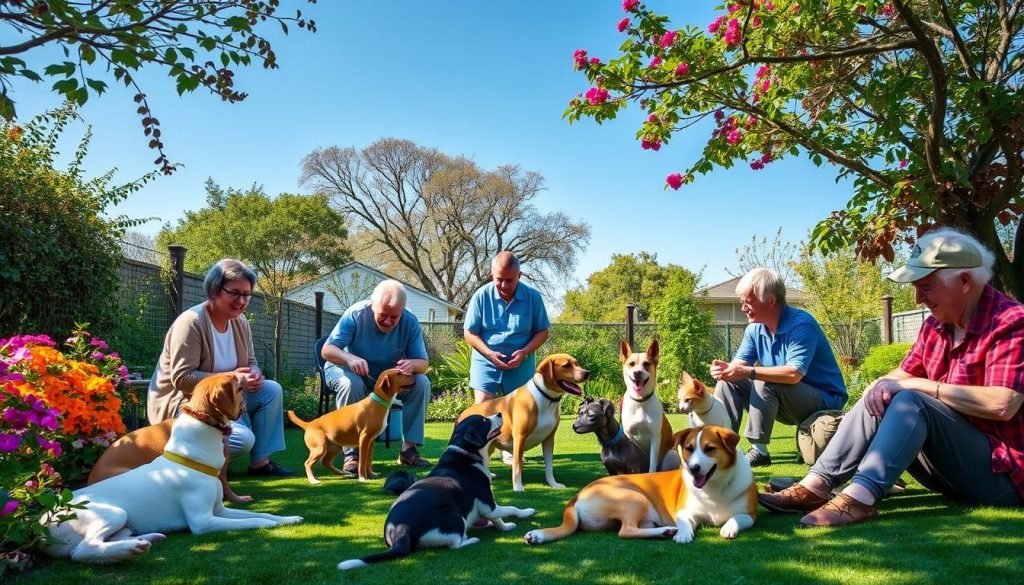
Dog Walking Programs
Dog walking programs are perfect for retirees who love animals and want to stay active. The Dog’s Trust offers national vacancies for dog walkers. This role lets volunteers enjoy the outdoors and help rescue dogs get exercise.
Animal Shelter Support
Animal shelters need volunteers for many tasks. At RSPCA, fostering dogs is key to helping them find homes. You need to be 18, have a secure garden, and have time for the dogs. No experience is needed, as training is given.
Wildlife Conservation Projects
Nature-loving retirees will find wildlife conservation projects exciting. Wildlife ACT, for example, has won awards for its conservation work. These projects welcome older volunteers, valuing their skills and experiences.
| Volunteering Activity | Time Commitment | Benefits |
|---|---|---|
| Dog Walking | Flexible | Physical exercise, animal companionship |
| Animal Fostering | Full-time care | Improved rehoming chances for animals |
| Wildlife Conservation | Project-based | Nature immersion, global impact |
Helping animals through volunteering is good for both the animals and the volunteers. It can even help volunteers live longer. So, it’s a win-win for everyone involved.
Heritage and Cultural Conservation
Heritage volunteering lets retirees help save Britain’s rich history and cultural gems. The National Trust offers a great way to get involved. You can guide tours or help with conservation, using your skills and interests.

Working in cultural conservation is rewarding for those who love history, art, or architecture. It’s not just about keeping the past alive. It’s about leaving a lasting legacy for others to enjoy.
Studies show the benefits of volunteering in heritage:
- Adults over 50 who visit museums often have lower dementia rates over 10 years.
- Being involved in culture can help prevent depression in older age.
- Heritage activities are better for wellbeing in later life than physical or mental ones.
The heritage sector is eager to have older volunteers. In 2021/22, 64% of volunteers were 50+, with 40% over 65. This shows how important retirees are in preserving UK culture.
“Volunteering in heritage not only preserves our past but enriches our present and shapes our future.”
By volunteering in heritage, retirees can fight loneliness and boost their wellbeing. It’s a chance to share knowledge, learn new things, and join a community that values our cultural heritage.
Supporting Local Communities
Volunteering in your local community is rewarding in retirement. It lets you help others and stay active. Here are some ways to volunteer and support your community.
Food Banks and Meal Services
The cost-of-living crisis has made food banks and meal services vital. Volunteering here can help those struggling with food insecurity. In fact, 55% of people in the UK volunteered in 2021-2022, many for food-related causes.
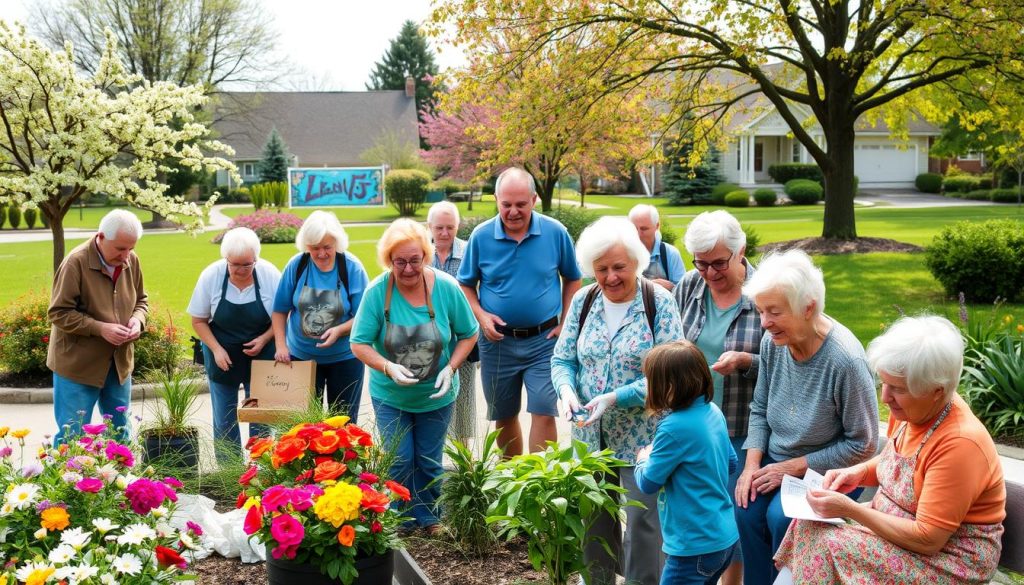
Community Gardens
Community gardens are great for the environment and people. They help grow food and bring communities together. Gardening is calming and helps your neighbourhood. It’s perfect for outdoor volunteering.
Neighbourhood Watch Programs
Neighbourhood watch programs help keep communities safe. They make areas safer and more connected. It’s a great way for retirees to help with safety.
| Volunteering Activity | Impact | Skills Required |
|---|---|---|
| Food Bank Support | Reduce food insecurity | Organising, customer service |
| Community Gardening | Improve local environment | Gardening, planning |
| Neighbourhood Watch | Enhance community safety | Communication, vigilance |
34% of people in the UK volunteer monthly. Joining them can help others and boost your health. Volunteering can lower stress and boost confidence. So, start volunteering today and make a difference in your community.
Educational Volunteering Opportunities
Educational volunteering lets retirees share their knowledge with younger people. Tutoring in retirement is now more popular. It gives retirees a chance to help their communities.

Retired volunteers, aged 18 to 82, can really help through tutoring. They commit to one hour a week for 10-20 weeks. They help 1-3 students get ready for SATs or GCSEs.
Many groups offer online training and support. This makes tutors feel ready for their job. They also pay for travel, up to £5 per session, to help those who are tight on cash.
Benefits of Educational Volunteering
- Combat stress, anxiety, and depression
- Enhance communication skills and confidence
- Meet new people and reduce feelings of isolation
- Improve resilience among participants
For those who can’t meet in person, online tutoring is an option. This way, volunteers can help from home. They can reach students all over the place.
| Volunteer Activity | Impact |
|---|---|
| RSVP Knitting Groups | Produce over 50 big bin-bags of knitted goods monthly across the UK |
| Volunteer Driving Schemes | Provide essential transport for older individuals in rural areas |
| Befriending Services | Reduce patient anxiety at healthcare facilities |
Educational volunteering isn’t just about tutoring. Retirees can lead workshops at community centres or museums. They share their skills and experiences with eager learners.
Healthcare and Senior Support Services
Retirees looking for ways to give back can find joy in healthcare volunteering and senior support. These roles let them help others and stay active.
Hospital Volunteering
Hospitals need volunteers to improve patient care and help staff. Tasks include welcoming visitors and helping with paperwork. Many retirees enjoy comforting patients and their families during tough times.
Senior Centre Activities
Senior centres are lively places where volunteers are key. They lead activities, plan events, and offer friendship. For example, Living Well Groups are run by volunteers. They provide social activities and health tips for older community members.
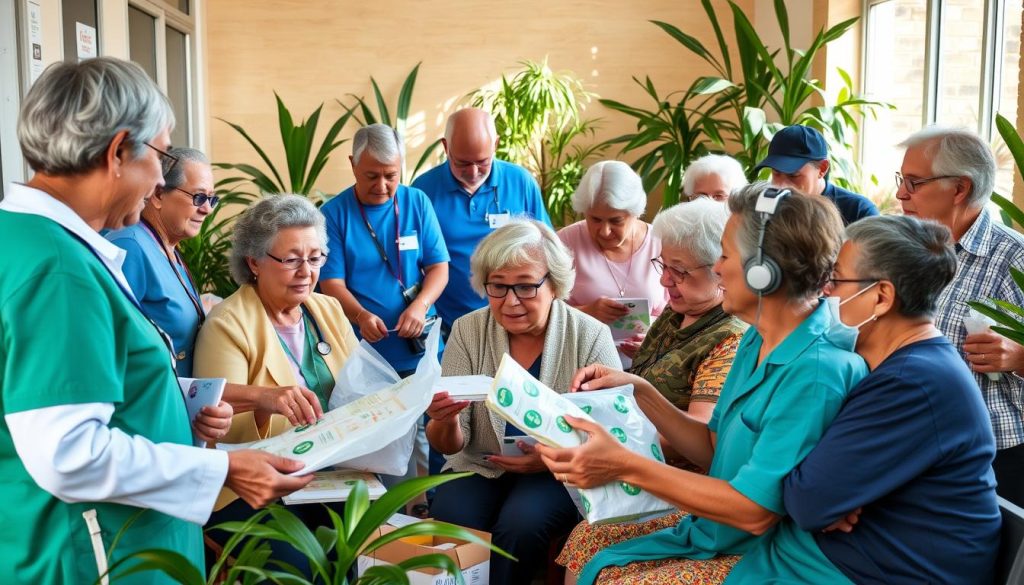
Hospice Care Support
Hospice volunteers support patients and their families greatly. They offer emotional support, help with errands, or just be there. It’s a challenging but rewarding role.
Age UK’s Connect and Support service shows the power of senior support. Volunteers spend at least 2.5 hours a week helping older people across the UK. This service helps seniors access important services and activities.
| Volunteer Service | Time Commitment | Impact |
|---|---|---|
| Age UK Connect and Support | 2.5 hours/week minimum | Nationwide virtual assistance |
| Telephone Befriending | Weekly calls | Reduces social isolation |
| Living Well Groups | Varies | Socialisation and health advice |
Healthcare volunteering and senior support services give retirees a chance to use their skills. They help build connections and make a real difference in their communities.
Environmental Conservation Projects
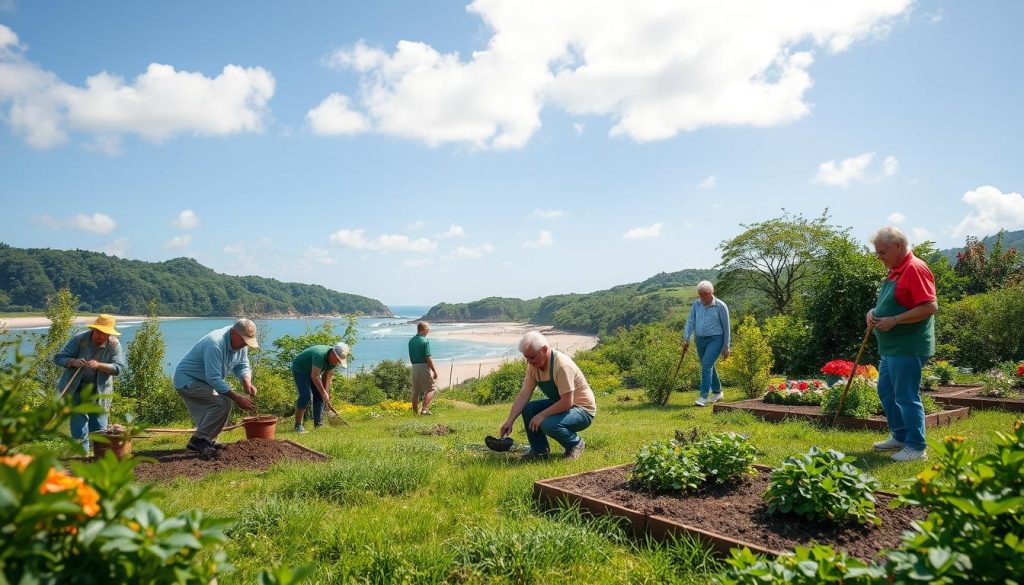
Retirees looking to help the planet can find many rewarding opportunities. These projects let you protect nature while enjoying the outdoors.
Conservation projects include everything from local clean-ups to global wildlife protection. You might plant trees, restore coral reefs, or help with dinosaur digs!
There are many roles in environmental conservation. Some like hands-on fieldwork, while others prefer administrative or educational tasks. Many programs are designed for volunteers over 50, making it a comfortable and fulfilling experience.
- Wildlife rehabilitation (e.g., working with sloths or turtles)
- Marine ecosystem conservation
- Reforestation initiatives
- Endangered species protection (e.g., black rhinos, Asian elephants)
Program costs vary, from €143 to €1069 per week. You can choose from one week to 30 weeks, fitting your lifestyle.
Environmental volunteering combines nature love with travel. Places like Fiji, Australia, and New Zealand offer cultural experiences and conservation work.
“Volunteering in environmental conservation has given my retirement a new purpose. I’m leaving a positive legacy for future generations while having the adventure of a lifetime!”
Thousands of seniors join these projects every year. They use their skills, gain new experiences, and make a big difference for our planet.
Disaster Relief and Emergency Response
Retirees can make a big difference in disaster times. They help communities when they need it most. This is a great way to give back.

Red Cross Opportunities
The Red Cross leads in disaster relief. They have many volunteering roles. Volunteers help in floods, tornadoes, and hurricanes across the UK and abroad.
Their work is key in giving immediate help. It’s vital for those in need.
Emergency Preparedness Programs
Emergency programs help reduce disaster impact. Retirees can use their skills to help. They teach the public and prepare emergency plans.
Organisations like All Hands and Hearts have over 51,000 volunteers. They work on 98 projects worldwide. Volunteers can help for a week or months.
HelpAge International focuses on older people in emergencies. They’ve worked for 20 years. Their research shows older people need to be included in relief efforts.
By joining disaster relief, retirees help build stronger communities. They also grow personally and find fulfillment.
Virtual Volunteering Options
The digital age has brought a new era of online volunteering. It offers retirees exciting ways to help from home. Remote volunteer work is now more popular, allowing people to use their skills and time without worrying about location or mobility.
The Smithsonian Digital Volunteers programme is a great option. It lets participants transcribe historical documents. This helps preserve collections for the future and connects volunteers with history.

Ancestry.com’s World Archives Program (AWAP) is perfect for those into genealogy. Volunteers transcribe historical images into a searchable database. This helps people worldwide discover their family histories and connect with their roots.
The Missing Maps project is another unique opportunity. Volunteers help create maps of areas where data is scarce. This aids disaster relief and development projects.
| Virtual Volunteering Platform | Focus Area | Impact |
|---|---|---|
| Be My Eyes | Visual assistance | Over 2,000,000 volunteers in five years |
| UN Volunteer Program | Various global issues | 12,000 volunteers annually, 94% satisfaction rate |
| Amnesty Decoders | Human rights research | Multiple significant projects worldwide |
These options show that you can make a difference from anywhere. Most online volunteering roles need less than four hours a week. This makes it easy for retirees to fit these activities into their schedules and have a big impact globally.
Finding the Right Volunteer Opportunity
Looking for the right volunteer role in retirement is an exciting journey. With so many options, it’s key to think carefully about finding volunteer work. We’ll look at how to find opportunities that match your interests and skills.
Assessing Your Interests
Begin by thinking about what you’re passionate about. Consider what causes you care about and how you want to help. Whether it’s helping the environment, supporting healthcare, or working with kids, there’s a role for you.

Evaluating Time Commitment
Think about how much time you can give to volunteering. Some roles need you every week, while others are more flexible. Places like International Volunteer HQ (IVHQ) offer over 300 projects in 40+ countries, so you can pick what fits your schedule.
Researching Organisations
Do your homework on the organisations you’re interested in. Look for ones that share your values and have a good track record. For example, GoEco has helped over 15,000 volunteers worldwide and has special programs for retirees.
“Volunteering significantly enhances social life and reduces feelings of loneliness, particular among those over 55.” – 2016 Oxfam survey
Effective volunteer matching is key for a great experience. Many groups, like Volunteering Matters, value the skills and experience retirees bring. By considering your interests, time, and researching groups, you’ll find a role that’s both rewarding and makes a difference.
Getting Started with Volunteering
Starting to volunteer in retirement is an exciting journey. The process of joining is simple and welcoming. Many groups offer flexible roles, fitting different interests and schedules.
To start, look for local charities or groups that match your interests. The National Council for Voluntary Organisations (NCVO) is a great place to find opportunities. Also, 54% of retirees want to volunteer in their communities.
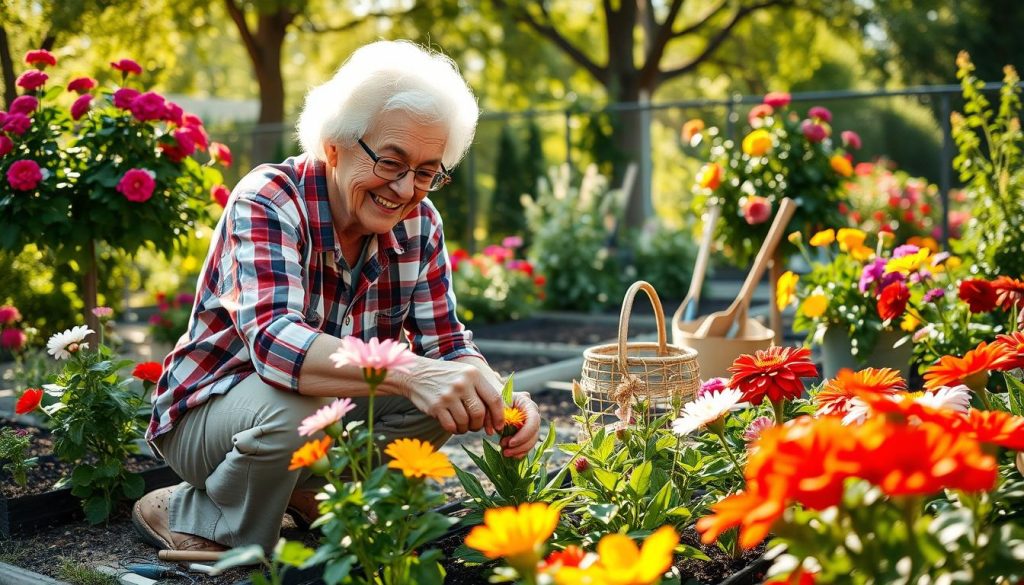
After finding a role, you’ll likely have a chat or interview. This is to make sure it’s right for both you and the organisation. Remember, 78% of charities depend on volunteers, so your help is greatly appreciated.
- Fill out any necessary paperwork
- Attend orientation sessions
- Complete required training
- Start with small tasks and gradually increase involvement
Be patient during the onboarding process. It’s normal to feel unsure at first. But, 87% of volunteers feel more connected to their community. You’re joining 24% of UK retirees who make a big difference, adding £22 billion to the economy each year.
“Volunteering is the ultimate exercise in democracy. You vote in elections once a year, but when you volunteer, you vote every day about the kind of community you want to live in.” – Author Unknown
Conclusion
Retirement volunteering brings huge benefits, helping people grow and make a difference. Studies show that just 100 hours a year can cut down on depression and even death risk for those over 50. This shows how much volunteering can improve both mind and body.
Volunteering in retirement can also boost your brain and help you make new friends. In fact, 85% of retired volunteers say it helped them make new friends. This is key, as feeling lonely can lead to health problems for up to 17% of Americans after they retire.
But volunteering isn’t just good for the individual. With nearly 25% of volunteers in America being 65 or older, retirees are key to helping their communities. They can use their time, skills, and experience to make a real difference, whether through local United Ways or other groups.
Starting to volunteer in retirement can make your life more fulfilling and meaningful. It’s a chance to stay active, share your knowledge, and keep contributing to society. So, why not look into the many volunteering options out there and start this rewarding journey?
